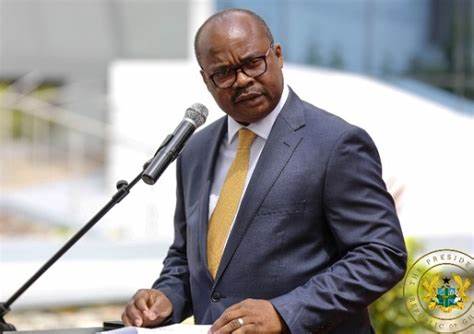
Audio By Carbonatix
Despite projections that the policy rate of the Bank of Ghana will go down by the end of the first half of this year to ease cost of borrowing, it does not look so because of some perceived risks in the economy.
This is coming at a time that the Monetary Policy Committee begins its 100th quarterly meeting, from today 26th May, 2020 to review the state of the Ghanaian economy.
Prior to the end of the year, there were high expectations that the policy rate – the rate at which commercial banks borrow from the Bank of Ghana - will fall to lower the borrowing costs of household and business consumers.
Fitch Solutions and Moody’s Analytics have all projected about 1.0 percentage point drop in the policy rate by May this year. Their forecast were based on expected lower inflation and improve growth rate in the first quarter of this year.
However, the large financing gap and debt which possess some threat to the economy could compel the MPC of the Bank of Ghana chaired by Governor Dr. Ernest Addison to maintain the policy rate at 14.5% for the 7th consecutive time since March last year.
Banking Consultant Dr. Richmond Atuahene told Joy Business that the policy rate will remain unchanged because of developments within the economy in the last couple of months, which does not support a reduction in the base lending rate.
“Looking at the various things that have happened over the last few months, including the announcement of taxes and taxes on fuel and others, and also looking at crude oil prices rising up to US$68 per barrel and other exigencies in the economy, I don’t think the policy rate can come down just in the near future. It has to stay there for some time.”
“And don’t forget that the policy rate level will also have something to do with interest rate, so we are in a dichotomy; we either keep the policy rate where it is and let the private sector not get access to cheap credit to expand the economy”, he further said.
The MPC will also assess the Bank of Ghana’s Composite Index of Economic Activity, the Business and Consumer Confidence indicator and make forecast for inflation and exchange rate, as well as proffer advise to the central government on measures to tackle the nation’s rising debt.
Latest Stories
-
The Suit is a shroud ; the fugu is our resurrection
2 minutes -
NDC appoints Inusah Fuseini as Ayariga steps down from Ayawaso East primary probe committee
16 minutes -
T-bills auction: Government exceeds target by 246; interest rates fall sharply to 9.9%
22 minutes -
Lands minister heads to South Africa for annual African mining investment conference
32 minutes -
Frank Quaye Writes: Nullify Ayawaso East primary to protect NDC’s integrity and goodwill
36 minutes -
Medeama survive Samartex test to reach FA Cup last eight
44 minutes -
Vote- buying, party reform, and the unfinished business of internal democracy in the NDC
59 minutes -
Mahama Ayariga withdraws from NDC Ayawaso East probe as Majority Caucus demands cancellation of primary
1 hour -
Majority caucus calls for cancellation of Ayawaso East primary over vote-buying allegations
1 hour -
Jachie-Pramso SHS appeals for support as headmaster hails discipline
2 hours -
NDC committee given February 10 deadline to submit Ayawaso East vote-buying report
3 hours -
Abossey Okai spare parts dealers threaten one-week strike over new VAT regime
4 hours -
Sentencing is not a lottery -Lawyer defends Agradaa’s sentence reduction
4 hours -
Ghanaian highlife maestro Ebo Taylor dies at 90
4 hours -
Gunmen kill 3 people and abduct Catholic priest in northern Nigeria
4 hours

